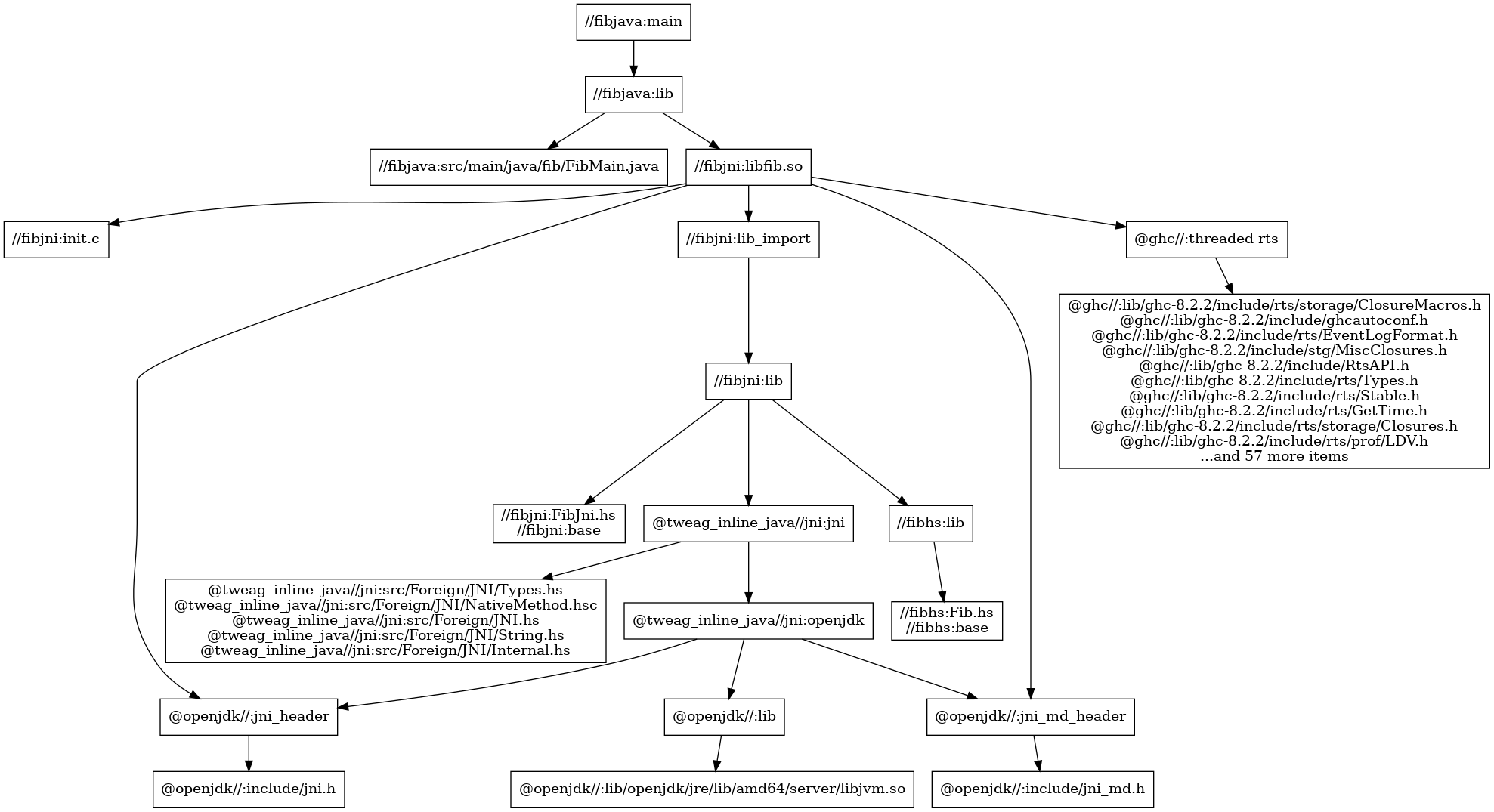Bazel to the Future
One of the promises of Bazel is “One tool, multiple languages”. Let’s validate this claim - but which languages to choose?
I’ve recently been learning Haskell and came across this post by Tweag announcing Bazel rules for Haskell. Another project by Tweag provides Haskell JNI bindings and is setup with a Bazel build, so the goal is to create a single Bazel build that produces a Java application calling through JNI into Haskell. To keep it simple the Haskell code will calculate a Fibonacci number.
Resulting repo is here: http://github.com/markdingram/java-jni-haskell, tested on Fedora.
To run:
bazel run //fibhs:main 10
bazel run //fibjava:main 10
...
fib(10) = 89
Part 1 - Pure Haskell
First task was to create a pure Haskell library/application for Fibonacci:
fib :: Int -> Int
fib 0 = 1
fib 1 = 1
fib n = fib (n-1) + fib (n-2)
This proved to be straightforward, lifting the template from the rules_haskell_examples repo:
$ bazel run //fibhs:main 10
...
fib(10) = 89
Part 2 - JNI
Here the real excitement began. I found this repository with an example of a C++ JNI build, so that was the starting point.
Importing the upstream bazel JNI build was straightforward, following this section in the WORKSPACE
git_repository(
name = "tweag_inline_java",
remote = "https://github.com/tweag/inline-java.git",
tag = "v0.8.4")
The JNI library can then be referenced as a dependency with @tweag_inline_java:jni/jni
Before calling any Haskell methods, the Haskell FFI requires that the hs_init method (from HsFFI.h) method is called from C prior to any other calls. The standard JNI_OnLoad method in init.c is defined to trigger this at library load time.
From this point on I ran into a time consuming series of irritants caused by what seemed to be a combination of my lack of experience with Bazel/Haskell and misleading/incomplete documentation:
-
Unable to find the JNI header files in a subdirectory which turned out to be https://github.com/bazelbuild/bazel/issues/5497, I’m sure there is a more elegant approach but adding
../to the includes paths got past it. -
a blind alley triggered by the following paragraph in the Bazel docs for cc_binary, linkstatic:
The presence of this flag means that linking occurs with the -shared flag to gcc, and the resulting shared library is suitable for loading into for example a Java program. However, for build purposes it will never be linked into the dependent binary, as it is assumed that shared libraries built with a cc_binary rule are only loaded manually by other programs, so it should not be considered a substitute for the cc_library rule. For sake of scalability we recommend avoiding this approach altogether and simply letting java_library depend on cc_library rules instead.
Turns out the cc_library doesn’t retain the dynamic link to the Haskell runtime (check with ldd), leading to an error when trying to load the library from Java down the line. cc_binary does include that link so stick with that.
-
The non threaded Haskell runtime hangs when loaded from Java, using the Haskell threaded runtime was needed. The approach described here https://github.com/tweag/rules_haskell/issues/437 was the key.
-
Native libraries in
dataare handled differently by Bazel Java library vs binary - see https://github.com/bazelbuild/bazel/issues/1146. -
one self inflicted interlude, while wrestling with the above I spent some time seeing if an OSX build could be added, it soon became apparent this wouldn’t be straightforward. As per https://github.com/tweag/inline-java/issues/1 switching to the cpphs preprocessor is needed, however the MIN_VERSION_singletons macro wasn’t provided to cpphs leading to build errors. This was contrary to what was expected from a similar issue but I didn’t investigate any further.
Dependency Graph
One nice feature supported by Bazel is producing a dependency graph:
$ bazel query --nohost_deps --noimplicit_deps "deps(//fibjava:main)" --output graph > graph.dot
$ /usr/bin/dot -Tpng graph.dot -o deps.png
Resulting graph for this exercise:

Conclusion
Bazel has lived up to its claim, a single command can build & run either Haskell or Java/JNI/Haskell binaries.
The support for tagged import of the upstream Git JNI repository shows that Bazel, despite its monorepo origins, may be able to support multirepo approaches too.
Alternate Timeline
Eta with its own Bazel rules is an alternate approach, running Haskell direct on the JVM. Maybe for later investigation..
